Last Updated on November 4, 2022
“Blockchain” this term might not be new to you if you have been investing, following the banking, or cryptocurrency for over a few years. It’s a record-keeping technology also known as a ledger that keeps track of modifications to assets within the chain.
If you still find it confusing, let’s get deeper to understand it better.
What Is Blockchain?
The word Blockchain may look complicated, but its basic concept is quite simple.
A system that records information in a manner that makes it impossible for one to hack, change, or cheat is known as Blockchain.
Essentially, it is a transactions’ digital ledger that is distributed and duplicated across the whole network of computer systems. In the chain, each block holds a number of transactions, and whenever a new transaction takes place on the blockchain, its record is appended to all the participants’ ledger.
A blockchain is like a database. Do you know anything about “Database” here?
Let you know that a collection of information stored on a computer system electronically is known as a database. Data, or information, is generally structured in a tabular format that eases filtering and searching for precise detail in the database.
Now, you may have a question, why do we use databases and not spreadsheets?
Well, let you know that spreadsheets are crafted just for one person or, we can say, a small group of people. It houses a small amount of information and offers limited access to it.
But, when we craft a database, we can store a significantly huge amount of information that one can filter, access, and change quickly by any number of users at one time.
How Can Blockchain Be Useful For App Development?
Blockchain technology for app development is becoming popular day by day, and its usage influences varied industries. Some industries it has already transformed are real estate, healthcare, education, finance & apart from these there are many other use cases for blockchain.
As per stats, by 2024, the global blockchain technology market is likely to reach $20 billion.
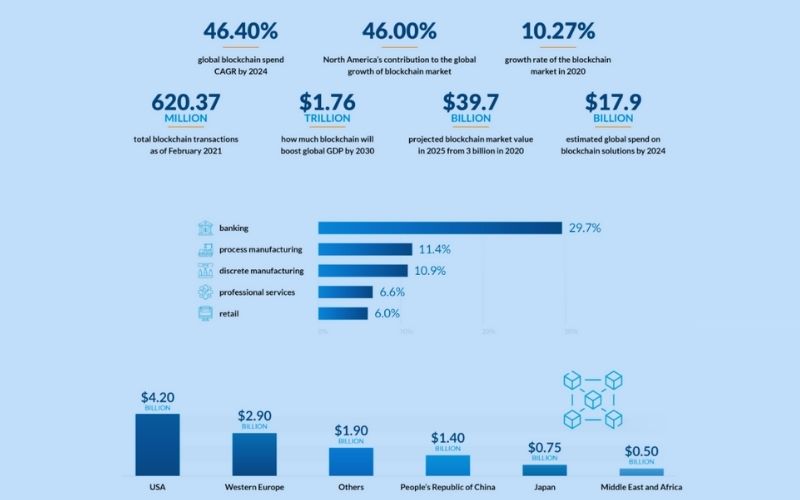
Today, we can witness that blockchain programming is finding its way towards creating a mobile app segment. The credit goes to its decentralized architecture, of which software developers and mobile apps are reaping the benefits to resolve various flaws.
Blockchain backs digital currency, like Bitcoin, Ethereum, and Litecoin, facilitating a transparent and secure payment process. This way, it cut off the need for a middleman.
Additionally, Blockchain permits holding an unchangeable and transparent record of the transactional digital information and ensures no unauthorized modification.
Let’s now check out how Blockchain will prove to be best for app development.
1. Easy To Implement
Developing a new blockchain can be difficult, but it’s pretty easy to implement. It saves app development time, and this way leads to reduced app development costs.
2. High Reliability
The infrastructure of the best blockchain technology is reliable and robust. As blockchain nodes are scattered globally and synced with each other, it ensures that identical data is copied across various devices available in distinct settings.
Because of its decentralized system, the chance of sudden crashes and collapses is less.
3. Best For Financial Institutions
Blockchain technology holds the caliber to house data permanently, which can be retrieved anytime and anywhere but can’t be changed. Thus, mobile apps built with blockchain will benefit financial institutions and logistics, and shipping companies.
4. Locates Issues Of In-App Purchases
Nowadays, using mobiles is not rocket science; users find it easy to use a mobile, but they still lack somewhere to make in-app purchases. Most of the users find the process of completing in-app purchases an issue always. The problem always lies in the process. It demands the users pay using the payment modes that are not available to them.
On the other side, if the app wants the users to use their credit cards to pay for in-app purchases, the users find it unsafe to share their personal and other relevant information.
Here, blockchain arrives as a savior. It eases the in-app purchases by allowing the users to use app coins as a payment method despite credit cards. The users get the app coins via a reward system as developers reward such coins to the users for buying in-app items and constant use.
5. Build Advertising Model
Today, developers invest in cost-per-installment ad campaigns to reach more audiences. But in that case, the profit share is divided among lots of middlemen. Thus, developers get reduced earnings.
Here, Blockchain replaces this model with a cost-per-attention approach, in which the users get the app coins as a reward for the time they spent on app ideas. It leads to no need for any middleman to increase the app revenue. The users get the coins as the reward that they use to make in-app purchases.
6. Streamline App Approval & Update Process
The non-transparent app approval and update processes are entirely handled by the Google Play Store and Apple Store. The unknown number of days and QA policies they follow make the app developers confused and lead to app rejection with no explanation.
Here Blockchain, an open-source platform, comes with complete transparency in the app launch process. When the developers upload apps, the system scans them to detect malware using an anti-malware engine.
Afterward, the app is temporarily stored until it’s chosen for manual review, and next, the app signature undergoes testing for validation. In the end, the app is posted for installation.
The entire process of app approval or update gets completed in just a few hours with Blockchain.
7. Prevent System Crashes
The developers stay clueless when the system collapses. They even don’t have hints about the things behind the crashes.
For example, the developers fail to figure out the reasons behind the system crash, whether errors, bugs, attacks, or a load of simultaneous requests. In fact, the time they take to catch up with the bugs is usually enough for the malware to eat it all.
Here, blockchain assists in avoiding such errors or attacks, offering the transparent structure that stores information as the records that the users track easily. When anyone tries to apply unauthorized modifications with false transactions, it just fails in the first attempt. The reason behind it is that the blockchain doesn’t allow any new block or change an old one. Moreover, with this technology , the users get to know all the unauthorized attempts that may attack the system.
What Are Blockchain Platforms?
Today, as most of us know blockchain technology’s potential, its demand is also increasing constantly. Blockchain was initially benefitting the financial industry, but with time, it’s becoming useful in varied industry verticals, like software development.
With the increasing development of blockchain apps, the demand for the blockchain development platform is also rising.
Let’s first know about the blockchain platform.
The platforms that facilitate the development of blockchain-based apps are known as blockchain platforms. Such platforms can be permissioned or permissionless.
Various popular blockchain platforms have developed blockchain frameworks easing the development and hosting of apps on the blockchain. Let’s check out a few.
Top Blockchain Platforms For App Development
1. Amazon Quantum Ledger Database (QLDB)

A wholly managed ledger database, Amazon QLDB offers an immutable, transparent, and cryptographically verifiable transaction log held by a central trusted authority. This blockchain platform tracks every app data modification and maintains a verifiable and complete history of alterations over time.
| Industry focus | Financial Services |
| Ledger Type | Permissioned |
| Consensus Algorithm | RAFT |
| Smart Contract | Yes |
| Governance | Central Trusted Authority |
2. Stellar

A distributed blockchain-based ledger, Stellar is used for allowing cross-asset transfers of value. It can deal with the exchanges between fiat-based currencies and cryptocurrencies. Using the Stellar network, one can develop smart devices, banking tools, and mobile wallets.
| Industry focus | Financial Services |
| Ledger Type | Both Public & Private |
| Consensus Algorithm | Stellar Consensus Protocol |
| Smart Contract | Yes |
| Governance | Stellar Development Foundation |
3. Azure Blockchain Workbench
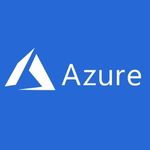
Azure comes with a fast, low-risk, low-cost, and fail-fast platform for organizations to get together by trying new business processes. It’s all supported by a cloud platform with a fantastic compliance portfolio in the industry.
| Industry focus | Cross-Industry |
| Ledger Type | Permissioned |
| Consensus Algorithm | Minimalistic Trusted Computing Base (TCB) |
| Smart Contract | Yes |
| Governance | Microsoft |
4. Tezos
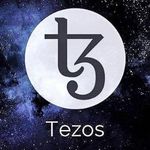
A decentralized blockchain platform, Tezos is self-governing and developed a true digital commonwealth. This platform is connected to a digital token, known as Tez or Tezzie. The platform is not based on extracting Tez; instead, the token holders get rewards for participating in the proof-of-stake consensus mechanism.
Tezos is a dApp and smart contracts platform, like Neo and other platforms. But, one thing makes it different from the other, i.e., its self-amending cryptographic mechanism.
| Industry focus | Digital Asset Management |
| Ledger Type | Private |
| Consensus Algorithm | Emmy+ |
| Smart Contract | Yes |
| Governance | Johann Gevers and Arthur and Kathleen Breitman |
5. IBM Blockchain Platform

An IBM’s commercial distribution of Hyperledger Fabric, IBM blockchain platform includes complete support of the open-source solution with the service level agreements (SLAs). It arrives with an advanced set of productivity tools for developing, operating, and controlling blockchain solutions.
| Industry focus | Cross-Industry |
| Ledger Type | Public and Private |
| Consensus Algorithm | IBM Blockchain Platform APIs |
| Smart Contract | Yes |
| Governance | IBM |
6. Tron

A blockchain-based decentralized digital platform, Tron holds its cryptocurrency known as TRX or Tronix. It targets hosting a world’s entertainment system for the cost-effective sharing of digital content. It ranks 31st among the cryptocurrencies in market capitalization.
Tron uses the P2P networks and blockchain technology’s features to remove the middleman and permit content creators to sell their work directly to consumers.
| Industry focus | Financial Services |
| Ledger Type | Public |
| Consensus Algorithm | DPoS |
| Smart Contract | Yes |
| Governance | Super Representative (SR) & Super Representative Partner(SRP) |
7. Hyperledger Fabric

One more project of Hyperledger, Hyperledger Fabric, helps develop blockchain-based solutions or apps using a modular architecture. The architecture’s modularity permits network designers to plug in the components they like.
Hyperledger Fabric framework is crafted for permissioned networks, allowing known identities to participate inside a system. They need to be authorized and should hold the creditability to take part in the blockchain.
| Industry focus | Cross-Industry |
| Ledger Type | Permissioned |
| Consensus Algorithm | Pluggable Framework |
| Smart Contract | Yes |
| Governance | Linux Foundation |
8. BlockCypher
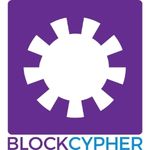
A simple, primarily RESTful JSON API, BlockCypher helps interact with blockchains, accessed over HTTPS or HTTP from the api.blockcypher.com domain. BlockCypher is a cloud-optimized blockchain platform strengthening cryptocurrency apps reliably.
| Industry focus | Cross-Industry |
| Ledger Type | Permissioned |
| Consensus Algorithm | RESTful JSON API |
| Smart Contract | Yes |
| Governance | DGBB |
9. Hyperledger Sawtooth

An enterprise-grade and modular platform, Hyperledger Sawtooth is crafted for developing, deploying, and executing distributed ledgers that facilitate digital records to stay maintained with no central authority.
This open-source blockchain platform of Hyperledger integrates with an enterprise-ready 1.0 version.
| Industry focus | Cross-Industry |
| Ledger Type | Permissioned |
| Consensus Algorithm | Pluggable Framework |
| Smart Contract | Yes |
| Governance | Linux Foundation |
10. Hedera Hashgraph

A fast, secure, and fair platform, Hedera Hashgraph, offers a new form of distributed consensus. It strengthens and allows developers to develop an entirely new class of dApps that are scalable.
| Industry focus | Cross-Industry |
| Ledger Type | Permissioned |
| Consensus Algorithm | HASHGRAPH |
| Smart Contract | Yes |
| Governance | Council of the world’s leading organizations |
11. Oracle Blockchain Platform

It is a complete distributed ledger cloud platform to provision blockchain networks. Moreover, it deploys and runs smart contracts to query and update the ledger. Oracle Blockchain Platform holds the blockchain network console to back integrated operations. It assists in beginning developing apps within minutes and allows you to catch up with the proof of concept in days or weeks.
| Industry focus | Cross-Industry |
| Ledger Type | Permissioned |
| Consensus Algorithm | Raft |
| Smart Contract | Yes |
| Governance | Oracle |
12. Ripple

Ripple targets connecting the payment providers, banks, digital asset exchanges, and corporate via a blockchain network known as RippleNet with no chargebacks. Furthermore, it permits global payments through a digital asset known as Ripple, one of the popular cryptocurrencies today, like Bitcoin and Ether.
| Industry focus | Financial Services |
| Ledger Type | Permissioned |
| Consensus Algorithm | Probabilistic Voting |
| Smart Contract | No |
| Governance | Ripple Labs |
13. Quorum

Like Ethereum, Quorum is also an open-source and free-to-use blockchain platform. It uses different and vote-based algorithms to process various transactions per second. As crafted to be permissioned, the networks using Quorum are not open to everyone. It holds the caliber to handle apps demanding high speed of private transactions and throughput processing.
| Industry focus | Cross-Industry |
| Ledger Type | Permissioned |
| Consensus Algorithm | Majority Voting |
| Smart Contract | No |
| Governance | Ethereum Developers and JP Morgan Chase |
14. Hyperledger Iroha

A modularized and simple distributed ledger system, Hyperledger Iroha is based on a fast and highly secure consensus algorithm known as Yet Another Consensus that protects Iroha networks from failures or adversary nodes.
| Industry focus | Cross-Industry |
| Ledger Type | Permissioned |
| Consensus Algorithm | Chain-based Byzantine Fault Tolerant |
| Smart Contract | Yes |
| Governance | Linux Foundation |
15. Centrifuge

A platform that permits the development of distributed blockchain systems on the Polkadot and Kusama networks is the centrifuge. Thus, it can interact smoothly with Polkadot once it becomes a parachain and gets benefits from the consensus and security protocols of Polkadot’s Relay Chain.
| Industry focus | Digital Asset Management |
| Ledger Type | Permissioned |
| Consensus Algorithm | consensus |
| Smart Contract | Yes |
| Governance | Radial (RAD) |
16. Consensys Quorum

It facilitates enterprises to use Ethereum for their popular blockchain apps. Businesses can depend on the Quorum open-source protocol layer and also integrate on its top the product modules from ConsenSys, in-house development team, or other companies to develop customizable high-performance apps.
| Industry focus | Cross-Industry |
| Ledger Type | Permissioned |
| Consensus Algorithm | Majority Voting |
| Smart Contract | No |
| Governance | Ethereum Developers and JP Morgan Chase |
17. Corda

A popular blockchain platform, Corda allows institutions to transact straight with smart contracts by eliminating expensive frictions in business transactions. It operates in a permissioned mode; it improves privacy and provides fine-grained access control to digital records. Furthermore, Corda is a permissioned blockchain that permits authorized participants to access the data, not the whole network.
| Industry focus | Financial Services |
| Ledger Type | Permissioned |
| Consensus Algorithm | Pluggable Framework |
| Smart Contract | Yes |
| Governance | R3 Consortium |
18. EOS

A blockchain platform, EOS is crafted for the development of decentralized applications. Its target is to provide dApp’s hosting, smart contract power, and decentralized storage of enterprise solutions. Also, it eliminates the users’ fees, i.e., one who wants to reap the benefits of a dApp based on EOS can use it for free.
| Industry focus | Cross-Industry |
| Ledger Type | Permissioned |
| Consensus Algorithm | Delegated Proof-of-Stake |
| Smart Contract | Yes |
| Governance | EOSIO Core Arbitration Forum(ECAF) |
19. Stratis Platform
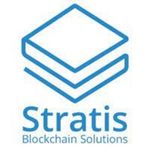
A flexible and powerful Blockchain Development Platform, Stratis is crafted for real-world enterprise and financial services needs. Stratis’s architecture is Bitcoin-based, which is the most secure blockchain so far. Moreover, it offers a feature-rich ecosystem with SDKs and tooling that facilitates solutions developed with assurance and confidence.
| Industry focus | Enterprise Application |
| Ledger Type | Permissioned |
| Consensus Algorithm | C# and .NET |
| Smart Contract | Yes |
| Governance | Microsoft |
20. Multichain

This blockchain platform assists organizations in developing and deploying blockchain apps faster. It creates various key-value, identity databases, or time series on a blockchain. It’s ideal for timestamping, data sharing, and encrypted archiving.
| Industry focus | Cross-Industry |
| Ledger Type | Permissioned |
| Consensus Algorithm | fork of Bitcoin Core |
| Smart Contract | Yes |
| Governance | Coin Sciences Ltd |
21. OpenChain

An open-source distributed ledger technology, OpenChain is best suited for organizations looking for digital assets management in a scalable and secure way. It uses Partionned Consensus, in which one instance will just hold a single authority for transactions’ validation.
| Industry focus | Digital Asset Management |
| Ledger Type | Permissioned |
| Consensus Algorithm | Partionned Consensus |
| Smart Contract | Yes |
| Governance | CoinPrism |
22. Xooa

This blockchain platform strengthens users belonging to all blockchain expertise levels to develop NFT marketplaces and other blockchain apps on the cloud through easy to use and streamlined interface. You can reap the benefit of Xooa’s API gateway, low code tools, and other robust features to generate ten times faster time-to-app.
| Industry focus | Cross-Industry |
| Ledger Type | Public |
| Consensus Algorithm | Xooa API gateway |
| Smart Contract | Yes |
| Governance | American technology company |
23. Ethereum

A native cryptocurrency of Ethereum, Ether is best for charging the Ethereum ecosystem. It is a permissionless (public) blockchain platform developed for restricted access vs. mass consumption. Also, it’s a PoW (Proof of Work)-based platform that is comparatively slower when it comes to speed. A developer who develops apps using this platform needs to pay charges in Ethers for running the apps and executing transactions on the Ethereum network.
| Industry focus | Cross-Industry |
| Ledger Type | Permissionless |
| Consensus Algorithm | Proof of Work |
| Smart Contract | Yes |
| Governance | Ethereum Developers |
24. BigchainDB

It’s a blockchain-based database that is query-able, decentralized, has native support or various assets, and much more. Although, being a blockchain database, BigchainDB lacks the business logic layer or processing layer for the assets it houses. By integrating BigchainDB and Hyperledger Fabric, we get the best solution for the digital future, which helps develop smart contracts for usage across industries.
| Industry focus | Cross-Industry |
| Ledger Type | Permissionless |
| Consensus Algorithm | Tendermint |
| Smart Contract | Yes |
| Governance | Incentive-driven, easy-to-integrate platform |
25. Dragonchain

It is crafted to offer enterprises and blockchain developers the valuable resources needed to build blockchain apps in minutes. It is mainly created for enterprises and is private/public hybrid platform that offers high performance and is easy to use to develop and deploy blockchain applications and microservice-based smart contracts.
| Industry focus | Government Agencies |
| Ledger Type | Permissionless |
| Consensus Algorithm | JSON with standardized structure |
| Smart Contract | Yes |
| Governance | Joe Roets |
26. NEO

It is crafted to build scalable dApps, and its base asset is the NEO token. The NEO token is best for generating GAS tokens that help pay transaction fees to run apps on the network.
| Industry focus | Cross-Industry |
| Ledger Type | Permissionless |
| Consensus Algorithm | dBFT |
| Smart Contract | Yes |
| Governance | GAS |
How To Select A Blockchain Platform For Your Business?
Before selecting a blockchain platform for your app ideas, you should ask yourself some questions.
Q.1 How Much Privacy Does Your App Need?
Blockchain is chiefly divided into two:
1. Centralized: In which a single authority regulates the network and the details that are available to the users, and
2. Decentralized: In which the data is housed across the whole network.
On the other side, if the application promotes business transparency and trustlessness, you need to house the data on a public Blockchain development framework.
Q.2 What Are Your Scalability Requirements?
The blockchain technology platform should grow and adapt to it with the increment of participants and transactions. In Blockchain projects, scaling flaws are a big challenge. The transaction speed of Bitcoin and Ethereum is also not as high as Ripple, PayPal, or more.
Suppose your decentralized applications are not transaction-intensive and can perform well with an easy escrow agreement. In that case, you should limit the vendor and the network decision to cost, quality, and ease of use.
But, if your dApp needs extensive transactions, you need to examine the side-chain implications to access the network transaction fee and security/liability.
Must Read: Money Making App Ideas
Factors Affecting Cost for Developing Blockchain-Based Mobile Apps
Well, various factors affect the cost of developing a mobile app. Let’s discuss a few:
1. App Development Team
Hiring an in-house app development team to build your app may increase your app development budget. Going with an app development company will lead to an expected mobile app, but it may also affect a blockchain app development cost. A freelancer can also be a good option, but as you know, their working patterns are entirely different, which may affect your app development project.
2. App Development Platform
Next, for developing an app, you will need to pick an app development platform. You can go choose to create native or hybrid apps primarily for Android or iOS. Hybrid apps cost less as compared to native apps.
3. App Design & Functionality
The design and functionality you want to include in your app affect the cost of your app. The cost of simple apps is less as compared to medium and complex apps.
4. App Security & Hosting
You need to take care of your app’s security as the trust of your customers depends on the security your app offers. Dedicated servers with advanced multi-layer security measures are usually recommended to get flawless and smooth services. But, it can be expensive than shared hosting. Besides, your business scale and traffic density decide apt servers you need to rent.
5. App Maintenance & Updates
You need to maintain the APIs of your app to improve its UI. This way, it will demand periodic monitoring and maintenance like a forever process.
Also Read: How To Choose A Tech Stack For Developing A Mobile App
Conclusion
As blockchain moves faster, new platforms are emerging with more features and new releases. Obviously, many blockchain platforms are available in the market; enterprises just need to know which blockchain developer platform is best to develop highly scalable apps.
We have discussed various blockchain platforms that top brands use. We hope you find this post informative.
If you have any queries relevant to blockchain platforms, apps, or more, connect with us, we will guide you towards the right way.
Hire the best blockchain app development company that has highly experienced blockchain-based mobile app developers who can build your unique blockchain-based app ideas.

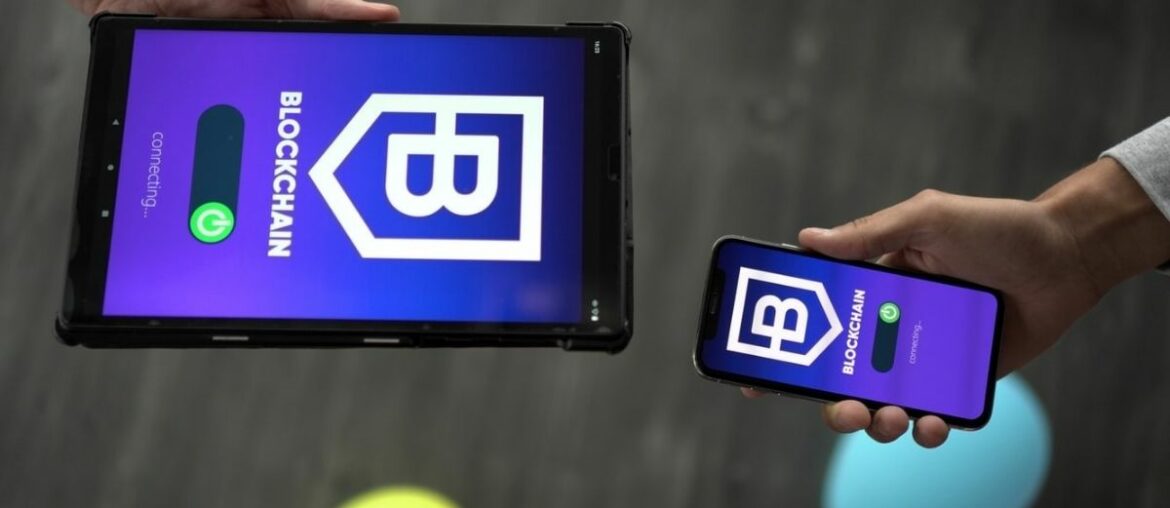
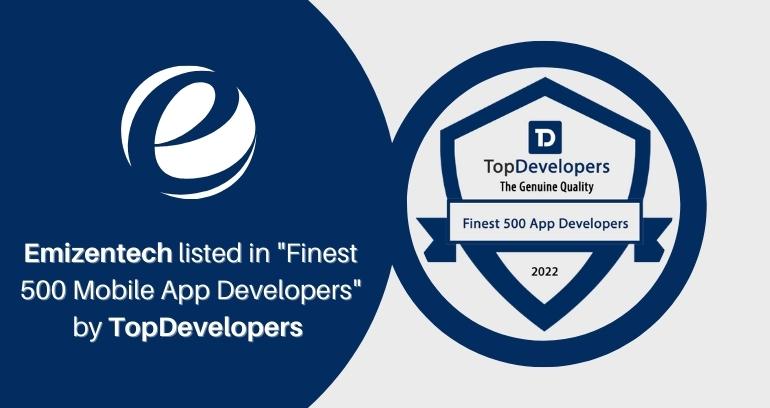

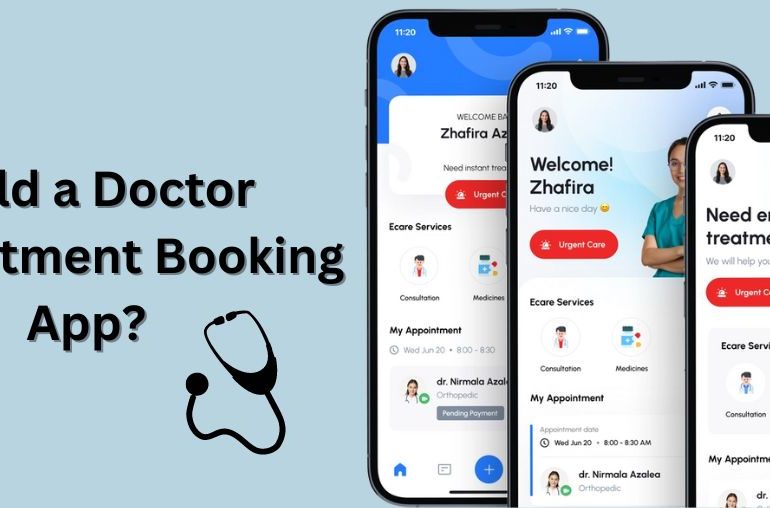
 USA
USA UK
UK Singapore
Singapore